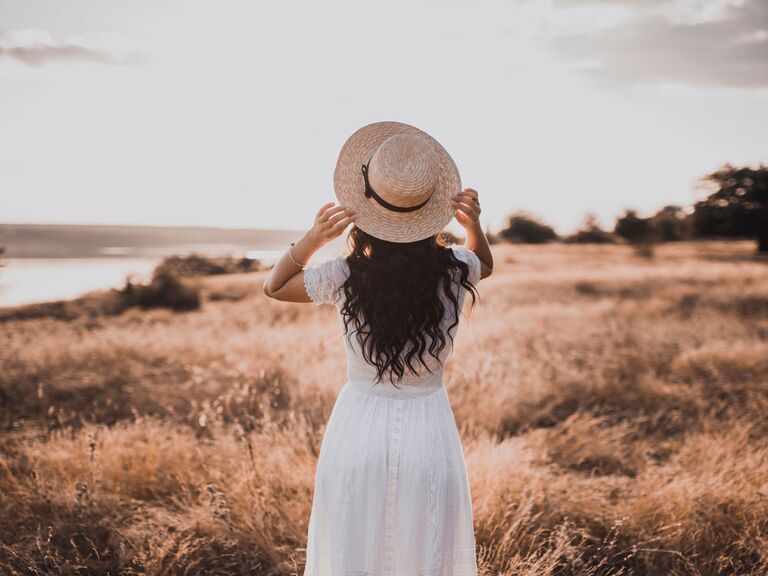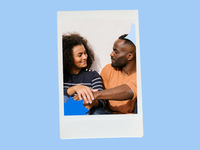Here's the Deal About What It Means to "Love Yourself" Before Entering a Relationship

If you've opened any social media app in the past year, you've likely been exposed to the "self-love" narrative. And, whether you're single or in a relationship, there's a good chance you've been told by well-meaning friends or family that you need to love yourself before you can love someone else. While it's logical advice, the idea of self-love is elusive; it can be difficult to define, especially when you compare your own self-love journey to others'. So, what is self-love? And do you really need to love yourself before you can date someone?
The answer is complicated. According to The Knot 2021 Self Love & Stress Study, which surveyed over 500 women-identifying respondents aged 18-29, 79% said you must love yourself before you can love someone else. This concept has strengthened as a result of COVID-19 too, as 56% said the idea of self-love became more important after the pandemic began.
Because the self-love definition can be open to interpretation, though, it may feel difficult (or downright impossible) to know if you "love yourself" enough to be ready for a relationship—but we're here to help. We tapped relationship counselors and therapists to break down what self-love is, along with practical ways you can make progress on your journey and grow into the best version of yourself before dating.
What is self-love?
What is self-love, actually? It's more than listening to an uplifting podcast or putting on a face mask after a long day. While these are rituals you can incorporate into your daily life to make progress on your journey, the true self-love definition has a deeper meaning. "Self-love is the ability to treat yourself with unconditional acceptance and compassion," says Samara Quintero, LMFT, CHT, and contributor at Choosing Therapy. "It's being kind to yourself the same way you'd be to your best friend, while allowing yourself to make mistakes and to be human. You accept yourself and every aspect of who you are, including the good parts and the not-so-good parts."
It's important to note that finding self-love is a journey, though, rather than a destination. "The idea that you need to love yourself before you can get into a relationship is such a common belief, especially for young women, and I do think this is true," Quintero adds. "However, there isn't a metaphorical mountain that you have to climb to reach a level of self-love that makes you worthy of a relationship. You have to have a sense of self-worth and self-esteem internally, as well as the capacity to make yourself happy in your life, before getting into a relationship."
Because of this, experts recommend looking at self-love as a lifelong experience instead of something you can achieve with a certain amount of self-care or counseling. In other words, your self-love progression will evolve as you age and gain new life experiences. "Nothing really is a finite achievement within the bounds of mental health and awareness," adds Dr. Meaghan Rice, PsyD, LPC. "Nothing stays static long enough to find comfort, so finding self-love amid fluidity is the better route."
Having a strong sense of self-love sets you up for success in all other aspects of your life, from your career to your friendships and, notably, your romantic relationships. So, if you've ever been told to love yourself before loving someone else, it's true—to a degree. While there's no secret code to crack, determining how to self-love in a way that works for you is crucial for establishing fulfilling, healthy relationships.
How do you find self-love?
Self-love is different for everyone, and what works for your best friend or your sibling might not work for you. Learning how to find self-love is all about experimenting with rituals and practices that make you feel confident and uplifted. In turn, you'll deepen your relationship with yourself, which will prepare you to give love to another person.
According to our study, 58% of respondents said they practice self-love by listening to music, while 47% said they prioritize getting enough sleep every night. Exercising and goal-setting were the third and fourth most popular self-love practices, but other responses included reciting positive self-affirmations, ending toxic relationships, saying "no," creating a healthy work-life balance and even self-pleasure.
The best way to find self-love is to set aside time for yourself to incorporate one or two rituals into your daily routine, as this will help you find what works (and what doesn't) for your needs. "Having blocked off time for yourself is so important," says Quintero. "Set aside time to journal, say some affirmations, listen to an uplifting podcast, or meditate. Making quiet time that's just for you will help center and ground yourself from within, rather than looking for a sense of peace or calmness from the outside world."
Once you've started working on improving your sense of self-love from within, branch out by immersing yourself in your community. Doing so will help you find fulfilling hobbies and activities that bring joy and purpose. "We can find value in community," says Rice. "For some, that might mean going to church, and for others, that means volunteering at their local non-profit. Additional activities like joining a club for niche interests resonate more closely."
It's also important to evaluate your personal relationships to ensure they're serving you in a positive way. If you're just starting out on your journey to develop self-love, having a strong support system will give you the guidance you need. "You need people who encourage your growth, push you forward, and love you in a special way," Quintero adds. "Having that fellowship is important on your journey."
Can you develop self-love in a relationship?
Since cultivating self-love is a process, you might wonder if you can make progress while in a romantic relationship. After all, the goal is to practice self-love throughout your entire life, so your progress is bound to overlap with partners too. Having a strong sense of self-love in a relationship is one of the best ways to set yourself up for success. And, while you can develop self-love in a relationship, it's important to establish the difference between growing with your partner and relying on your partner to provide a false sense of security.
"If you don't have a sense of self-acceptance, you'll begin to depend on another person to give that to you," explains Quintero. "Essentially, that means you're trying to make them give you something you can't give yourself. This creates dependency in relationships, and the other person can often feel they're being used." Adds Rice: "Preventative maintenance is always better than damage control, but it's not impossible to learn to love yourself amid a romantic relationship."
While you can foster your sense of self-love while in a relationship, the ideal time to lay the groundwork for your self-love journey is when you can focus solely on yourself. Working on self-acceptance before embarking on a relationship will help you grow into the best version of you, which will benefit all of your future relationships. "We have an innate need to connect with someone else," says Quintero. "But first, I encourage people to begin falling in love with their lives and take off the pressure of finding someone to make them happy. Be happy first, and then the right partner will come along."
If you are in a relationship and ready to improve your sense of self-love, though, keep an open line of communication so your partner can offer support. "You can definitely stay in a fulfilling relationship and work on your self-love journey," Quintero adds. "Inform your partner so they know what you're trying to do."
How do you know you've found self-love?
It's the million-dollar question: How do you know you love yourself enough? Since self-love looks different for everyone, it may be difficult to determine that you love yourself enough and are ready to enter a relationship. Instead, your journey to loving yourself will evolve over time as you grow and change. "There's a common saying that I like to reference: 'Wherever you go, there you are,'" says Quintero. "Your relationship with yourself is ongoing, so it's up to you to figure out how to love and be in a relationship with yourself throughout your life."
There are, however, a few distinguishing personality traits that can indicate the strength of your self-love, as well as your readiness for a relationship. "Being able to do things on your own is an important sign of self-love," explains Quintero. "A big indicator that you have low self-esteem or self-worth is if you don't like your own company. Aim to go out and do fun things just for yourself that don't involve anyone else."
The ability to stand up for your schedule and prioritize your own needs is also another sign of self-love. "Having the ability to say 'no' indicates that you can put yourself first," adds Rice. Plus, she notes that having reciprocal friendships and platonic relationships signifies that you're ready for a romantic relationship.
Ultimately, the work you put into your self-love journey early on will manifest in positive, uplifting relationships later in life. Plus, it'll give you practice in prioritizing the most important relationship of all: the one you have with yourself. "We teach others, especially our most intimate relationships, how to love us in the best possible way," says Rice. "And we only know that information after we have practiced alone."























